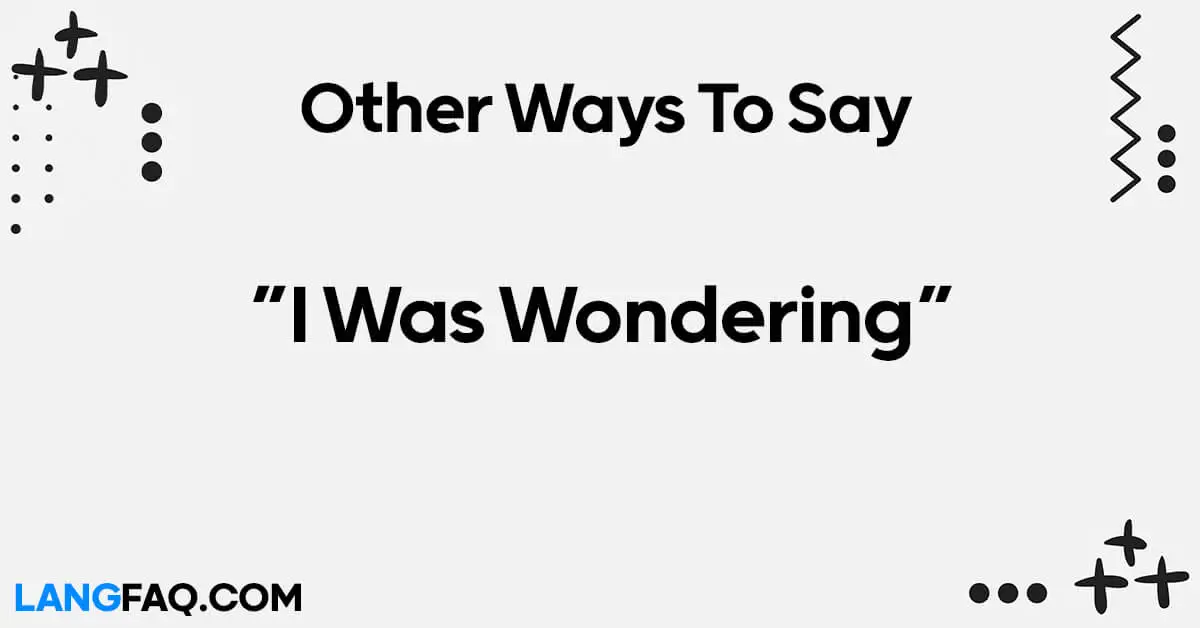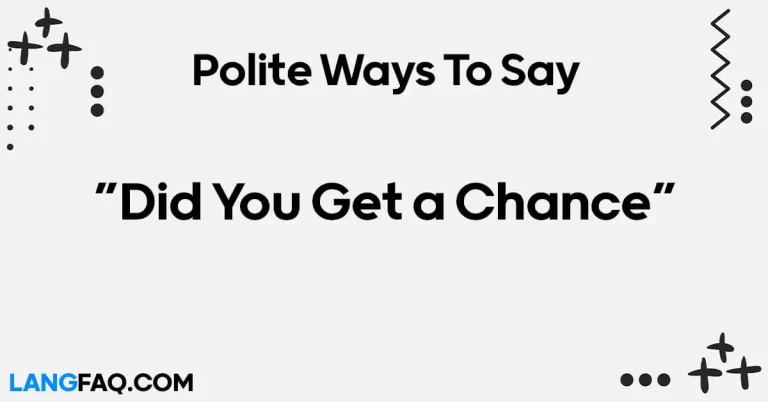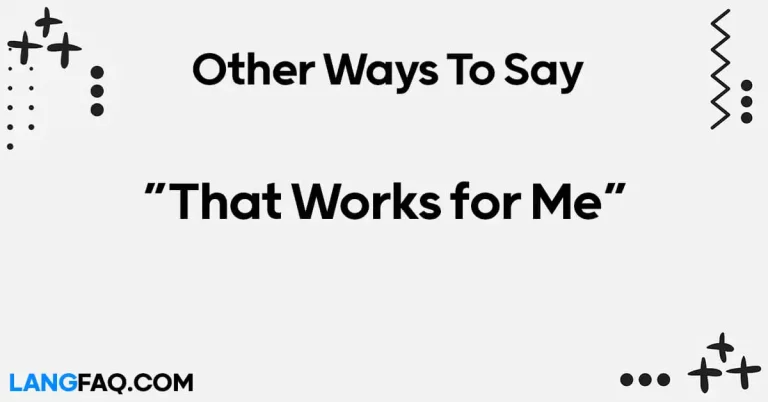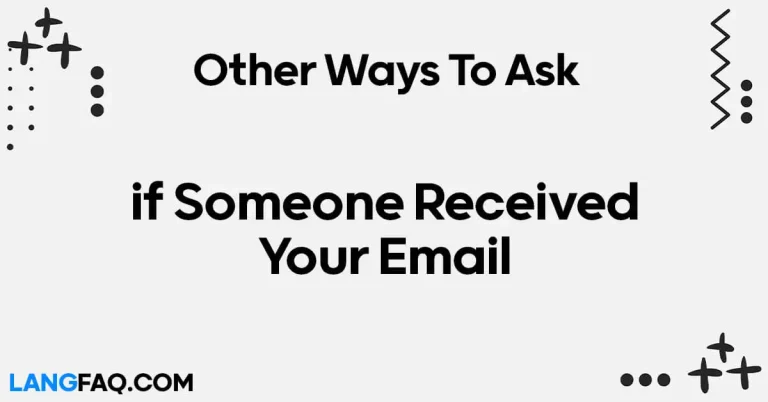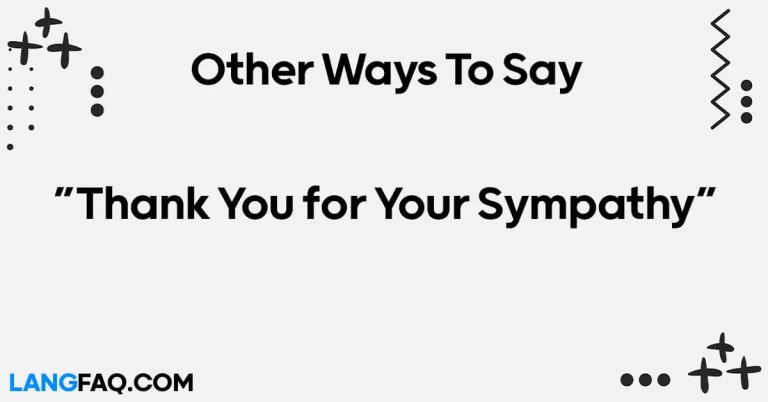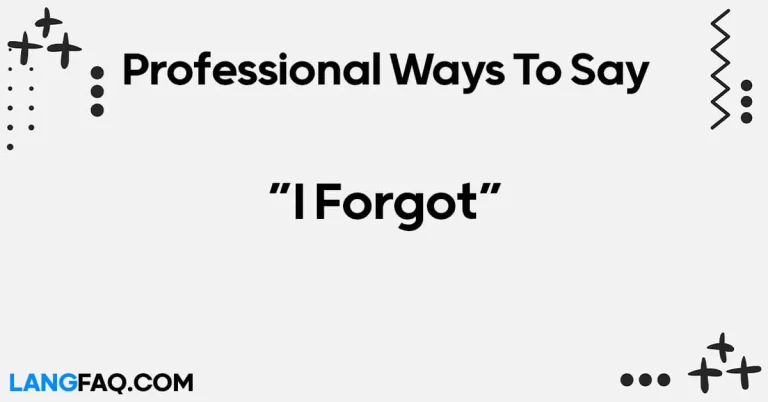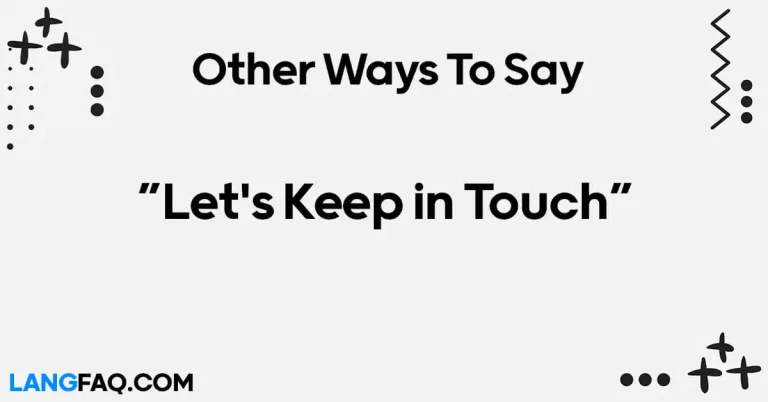In the realm of effective communication, the way we express curiosity matters. “12 Other Ways to Say ‘I Was Wondering'” introduces innovative and diverse alternatives to the conventional phrase, enriching your language repertoire. Elevate your communication game by exploring these engaging substitutes that bring vibrancy and depth to your expressions.
12 Other Ways to Say “I Was Wondering”
- I couldn’t help but ponder.
- It occurred to me.
- My mind drifted towards.
- I found myself contemplating.
- I was curious about.
- It struck me that.
- My thoughts meandered to.
- I was inquisitive regarding.
- It dawned on me.
- I was musing about.
- It came to my attention.
- I found myself questioning.
| Phrase | Meaning | Examples |
|---|---|---|
| I couldn’t help but ponder | Expressing involuntary contemplation | I couldn’t help but ponder the implications. |
| It occurred to me | Realizing or considering suddenly | It occurred to me that we need a new approach. |
| My mind drifted towards | Thoughts moving in a specific direction | My mind drifted towards the upcoming challenges. |
| I found myself contemplating | Engaging in thoughtful reflection | I found myself contemplating the meaning of life. |
| I was curious about | Expressing a desire for knowledge | I was curious about the origin of that tradition. |
| It struck me that | Noticing or realizing unexpectedly | It struck me that we’ve overlooked a key detail. |
| My thoughts meandered to | Thoughts wandering aimlessly | My thoughts meandered to memories of the past. |
| I was inquisitive regarding | Being curious or eager to learn | I was inquisitive regarding your innovative idea. |
| It dawned on me | Realizing gradually or becoming apparent | It dawned on me that we were heading the wrong way. |
| I was musing about | Engaged in contemplation or reflection | I was musing about the possibilities ahead. |
| It came to my attention | Noticing or being made aware of something | It came to my attention that the project is due. |
| I found myself questioning | Expressing doubt or seeking information | I found myself questioning the validity of the claim. |
This compilation of alternative phrases for “I was wondering” offers a diverse range of expressions to convey curiosity and contemplation. Enhance your communication by incorporating these phrases, adding depth and variety to your language use.
Is It Correct to Say “I Was Wondering”?
Certainly, the phrase “I was wondering” is correct and commonly used in English. It serves as a polite and considerate way to introduce a question or request. When you say “I was wondering,” you are indicating that you have a query or are seeking information in a courteous manner. This expression is versatile and can be employed in various contexts, both formal and informal.
Examples:
- Formal: “I was wondering if you could provide additional details about the upcoming project presentation.”
- Informal: “I was wondering if you’d like to join us for dinner this weekend.”
When to Use “I Was Wondering”:
- Politeness: It adds a polite touch to your inquiries, making them more considerate.
- Requests: It is often used before making a request to soften the tone.
- Seeking Information: It serves as an introduction to questions when seeking information.
Tips for Usage:
- Professional Settings: It’s suitable for workplace communication, especially when making requests or seeking clarifications.
- Everyday Conversations: It can be used casually in daily conversations to express curiosity or ask for someone’s opinion.
Common Alternatives:
- “I was curious…”
- “May I ask…”
- “Could you please…”
- “Is it possible…”
Professional Mail Example With “I Was Wondering”
Subject: Clarification on Project Timeline
Dear [Recipient’s Name],
I hope this email finds you well. I was reviewing the project timeline document, and a few points caught my attention. Specifically, I was wondering if you could provide some additional insights on the expected completion date for Phase 2.
As we aim for seamless collaboration and efficient project management, clarifying this detail would greatly assist in coordinating our efforts effectively. If there have been any updates or adjustments to the timeline, I’d appreciate being informed.
Additionally, I was wondering if a brief meeting could be scheduled to discuss this further. I believe that addressing these timeline considerations promptly will contribute to the overall success of the project.
Thank you for your attention to this matter. I appreciate your time and look forward to your response.
Best regards,
[Your Full Name] [Your Position] [Your Contact Information]
1. I Couldn’t Help but Ponder: Unleashing Spontaneity in Thought
Expressing curiosity can be a delightful journey, and saying, “I couldn’t help but ponder” adds a touch of spontaneity to your inquiries. This phrase is versatile, suitable for both formal and informal settings. In professional conversations, it infuses a sense of thoughtful consideration, while among friends, it sparks shared contemplation.
Example: Formal: “During the board meeting, I couldn’t help but ponder the potential impact of the new strategy on our market share.”
Informal: “As we caught up over coffee, I couldn’t help but ponder the adventures we could embark on this summer.”
Email Sample:
Subject: Exploring New Approaches
Dear [Recipient],
I trust this email finds you well. In our recent discussions about project enhancements, I couldn’t help but ponder the innovative ideas you proposed. Let’s schedule a meeting to delve deeper into these possibilities.
Best regards, [Your Name]
Variations:
- Colleagues: “I couldn’t help but ponder the efficiency of our current workflow.”
- Friends: “As we reminisced, I couldn’t help but ponder the evolution of our friendship.”
Insights: This phrase adds a layer of thoughtfulness to your expressions, making it ideal for exploring ideas and possibilities.
2. It Occurred to Me: Sudden Realizations in Communication
When you need to convey a sudden realization, saying “It occurred to me” is effective. This phrase is perfect for both formal and informal communication, providing a smooth way to introduce thoughts that might have just crossed your mind.
Example: Formal: “In the middle of the presentation, it occurred to me that incorporating client feedback is crucial for project success.”
Informal: “While we were chatting, it occurred to me that we haven’t celebrated your achievements lately.”
Email Sample:
Subject: Valuable Insights
Dear [Recipient],
As I reviewed the market trends, it occurred to me that our upcoming product launch aligns perfectly with the current consumer demands. Let’s discuss how we can leverage this.
Best regards, [Your Name]
Variations:
- Mentor to Mentee: “As you progress in your career, it will occur to you that continuous learning is key.”
- Friends: “During our hike, it occurred to me how much nature rejuvenates us.”
Insights: This phrase subtly emphasizes the spontaneous nature of realizations, making it suitable for various contexts.
3. My Mind Drifted Towards: Navigating the Landscape of Thoughts
When thoughts move in a specific direction, saying “My mind drifted towards” beautifully captures the fluidity of contemplation. This phrase is versatile, fitting seamlessly into both formal and informal discussions, allowing you to express the organic nature of your reflections.
Example: Formal: “During the strategic planning session, my mind drifted towards the potential challenges in the upcoming quarter.”
Informal: “As we discussed future vacations, my mind drifted towards the serene beaches we visited last year.”
Email Sample:
Subject: Strategic Insights
Dear [Recipient],
In our recent discussions about project milestones, my mind drifted towards the innovative solutions you proposed. Let’s schedule a meeting to explore these further.
Best regards, [Your Name]
Variations:
- Colleagues: “In the team meeting, my mind drifted towards optimizing our collaborative processes.”
- Friends: “While catching up, my mind drifted towards the adventures we can plan together.”
Insights: This phrase paints a picture of thoughts naturally flowing in a specific direction, making it effective for expressing focused contemplation.
4. I Found Myself Contemplating: Engaging in Thoughtful Reflection
When deeper contemplation is needed, saying “I found myself contemplating” adds a layer of seriousness to your expressions. This phrase is versatile, suitable for both professional and personal conversations, showcasing a higher level of introspection.
Example: Formal: “As I reviewed the financial reports, I found myself contemplating the potential impact of market fluctuations.”
Informal: “While stargazing, I found myself contemplating the vastness of the universe.”
Email Sample:
Subject: Strategic Reflections
Dear [Recipient],
In analyzing our current project trajectory, I found myself contemplating the long-term implications. Let’s schedule a discussion to align our strategies.
Best regards, [Your Name]
Variations:
- Mentor to Mentee: “In your career journey, you may find yourself contemplating the values that guide your decisions.”
- Friends: “During our weekend getaway, I found myself contemplating life’s simple joys.”
Insights: This phrase signals a deeper level of thought, making it suitable for moments of reflection and strategic considerations.
5. I Was Curious About: Expressing a Desire for Knowledge
To convey a genuine interest in a topic, saying “I was curious about” is both inviting and versatile. This phrase is applicable in various contexts, be it a formal discussion or a friendly conversation, showcasing a genuine eagerness to learn.
Example: Formal: “During the conference, I was curious about the innovative strategies discussed by the industry leaders.”
Informal: “As we chatted, I was curious about your recent adventures in sustainable living.”
Email Sample:
Subject: Seeking Clarification
Dear [Recipient],
While reviewing the project documentation, I was curious about the specific implementation details. Could we schedule a brief call to discuss this further?
Best regards, [Your Name]
Variations:
- Colleagues: “In the team meeting, I was curious about the rationale behind the new workflow.”
- Friends: “During our movie night, I was curious about your thoughts on the plot twist.”
Insights: This phrase highlights a positive curiosity, making it suitable for situations where a deeper understanding is sought.
6. It Struck Me That: Noticing or Realizing Unexpectedly
For expressing sudden realizations, saying “It struck me that” is impactful. This phrase is adaptable to both formal and informal scenarios, providing a succinct way to convey unexpected insights.
Example: Formal: “During the client presentation, it struck me that incorporating user feedback is essential for product improvement.”
Informal: “As we reminisced, it struck me that our friendship has flourished over the years.”
Email Sample:
Subject: Key Insight during Review
Dear [Recipient],
While reviewing the project metrics, it struck me that addressing user concerns could significantly enhance our product’s success. Let’s discuss how we can implement this.
Best regards, [Your Name]
Variations:
- Mentor to Mentee: “In your career journey, it may strike you that continuous learning is a key driver of success.”
- Friends: “During our coffee catch-up, it struck me that our shared memories are the foundation of our bond.”
Insights: This phrase adds a touch of realization, making it suitable for moments of clarity and sudden understanding.
7. My Thoughts Meandered To: Navigating the Terrain of Ideas
Expressing the wandering nature of thoughts, saying “My thoughts meandered to” allows for a flexible exploration of ideas. This phrase is versatile, suitable for both formal and informal settings, presenting a vivid picture of a mental journey.
Example: Formal: “During the brainstorming session, my thoughts meandered to potential solutions for the client’s challenge.”
Informal: “As we caught up over lunch, my thoughts meandered to the exciting possibilities for our upcoming trip.”
Email Sample:
Subject: Exploring New Concepts
Dear [Recipient],
While reviewing the project brief, my thoughts meandered to innovative concepts that could elevate our approach. Let’s schedule a discussion to explore these further.
Best regards, [Your Name]
Variations:
- Colleagues: “In the team meeting, my thoughts meandered to optimizing our workflow for greater efficiency.”
- Friends: “During our game night, my thoughts meandered to the laughter and joy shared in our group.”
Insights: This phrase captures the fluidity of thought, making it ideal for expressing a spontaneous exploration of ideas.
8. I Was Inquisitive Regarding: Nurturing a Spirit of Inquiry
When a sense of curiosity needs to be explicitly expressed, saying “I was inquisitive regarding” is both formal and precise. This phrase conveys a genuine interest in understanding more about a particular subject, making it suitable for professional discussions and personal conversations alike.
Example: Formal: “During the training session, I was inquisitive regarding the methodologies employed in the new software implementation.”
Informal: “As we caught up, I was inquisitive regarding your recent travels and the cultural experiences you encountered.”
Email Sample:
Subject: Seeking Further Insight
Dear [Recipient],
In our recent discussion about project timelines, I was inquisitive regarding the decision-making process behind our accelerated approach. Could we schedule a meeting to delve into this?
Best regards, [Your Name]
Variations:
- Colleagues: “In the team meeting, I was inquisitive regarding the metrics used to evaluate project success.”
- Friends: “During our weekend hike, I was inquisitive regarding your future plans and aspirations.”
Insights: This phrase adds a formal touch to expressing curiosity, making it effective when a more structured inquiry is required.
9. It Dawned on Me: Gradual Realization and Insight
For conveying a realization that gradually becomes apparent, saying “It dawned on me” is both insightful and adaptable. This phrase is suitable for both formal discussions and friendly exchanges, signaling a gradual understanding.
Example: Formal: “During the meeting, it dawned on me that incorporating sustainable practices aligns with our company’s values.”
Informal: “As we chatted, it dawned on me how much we’ve grown together over the years.”
Email Sample:
Subject: Strategic Alignment
Dear [Recipient],
While reviewing the market trends, it dawned on me that our upcoming product launch perfectly aligns with current consumer demands. Let’s discuss how we can capitalize on this insight.
Best regards, [Your Name]
Variations:
- Mentor to Mentee: “In your career journey, it may dawn on you that adaptability is a key professional skill.”
- Friends: “During our movie night, it dawned on me how much our tastes have evolved.”
Insights: This phrase conveys a gradual understanding, making it ideal for moments when insights unfold over time.
10. I Was Musing About: Delving into Creative Contemplation
When engaging in creative contemplation, saying “I was musing about” adds a touch of artistic flair to your expressions. This phrase is versatile, suitable for both professional and personal contexts, allowing you to convey thoughtful reflection with a creative undertone.
Example: Formal: “During the strategy session, I was musing about innovative approaches to enhance our market presence.”
Informal: “As we relaxed in the garden, I was musing about the beauty of nature and its calming effect.”
Email Sample:
Subject: Exploring Creative Solutions
Dear [Recipient],
While reviewing the project brief, I was musing about creative solutions that could add a unique touch to our approach. Let’s schedule a discussion to explore these ideas further.
Best regards, [Your Name]
Variations:
- Colleagues: “In the team meeting, I was musing about collaborative projects that merge efficiency with creativity.”
- Friends: “During our art class, I was musing about the endless possibilities of self-expression.”
Insights: This phrase infuses a creative element into contemplation, making it suitable for moments of imaginative reflection.
11. It Came to My Attention: Bringing Focus to Significant Details
To draw attention to specific details or realizations, saying “It came to my attention” is a powerful and formal choice. This phrase is applicable in various professional settings, enabling you to highlight key insights or information that requires consideration.
Example: Formal: “During the project review, it came to my attention that certain elements of our marketing strategy need immediate refinement.”
Email Sample:
Subject: Noteworthy Observation
Dear [Recipient],
While examining the client feedback, it came to my attention that addressing these concerns is pivotal for our project success. Let’s schedule a meeting to discuss potential solutions.
Best regards, [Your Name]
Variations:
- Colleagues: “In the team meeting, it came to my attention that streamlining our communication channels is crucial for project efficiency.”
- Mentor to Mentee: “As you navigate your career, it may come to your attention that consistent self-improvement is a key professional trait.”
Insights: This phrase signals a formal acknowledgment of important details, making it suitable for situations where a focused and serious tone is required.
12. I Found Myself Questioning: Exploring Curiosity and Skepticism
When a more profound inquiry or skepticism is warranted, saying “I found myself questioning” provides a nuanced approach to expressing doubt or a desire for clarification. This phrase is versatile, suitable for both formal and informal contexts, allowing you to navigate conversations with a thoughtful and inquisitive demeanor.
Example: Formal: “During the audit, I found myself questioning the validity of certain financial transactions, prompting a thorough investigation.”
Informal: “As we discussed future plans, I found myself questioning the feasibility of implementing such ambitious goals.”
Email Sample:
Subject: Seeking Clarification
Dear [Recipient],
While reviewing the project roadmap, I found myself questioning the alignment of our current strategies with the project objectives. Could we schedule a meeting to discuss this further?
Best regards, [Your Name]
Variations:
- Colleagues: “In the team meeting, I found myself questioning the efficiency of our current workflow and its impact on project timelines.”
- Friends: “During our book club discussion, I found myself questioning the author’s choice of plot twists and character developments.”
Insights: This phrase combines curiosity with a hint of skepticism, making it suitable for moments when a deeper level of inquiry is necessary.
Frequently Asked Questions:
Q: Can I use these alternatives in formal settings?
Absolutely! While some phrases may lean towards informal, many are versatile and suitable for formal conversations. It’s about gauging the context.
Q: How do these alternatives enhance communication?
These alternatives add variety and depth to your expressions, making your communication more engaging and memorable. They also showcase your linguistic versatility.
Q: Are these phrases suitable for written communication?
Certainly! Whether spoken or written, these alternatives can elevate the tone of your communication across various mediums.
Q: Can I mix and match these phrases?
Certainly, feel free to experiment and find combinations that resonate with your personal style. Language is a flexible tool for expression.
Q: Do these alternatives work in multiple languages?
Many of these phrases have universal appeal, transcending language barriers. However, consider cultural nuances when using them in different linguistic contexts.
Q: How can I remember to use these alternatives in daily conversations?
Practice is key. Start by incorporating one or two phrases into your everyday communication. Over time, it will become second nature.
Conclusion:
Diversifying your language is a journey towards enriched communication. “12 Other Ways to Say ‘I Was Wondering'” opens doors to a world where curiosity is expressed with finesse and creativity. Embrace these alternatives, and watch your conversations flourish with newfound vibrancy.

